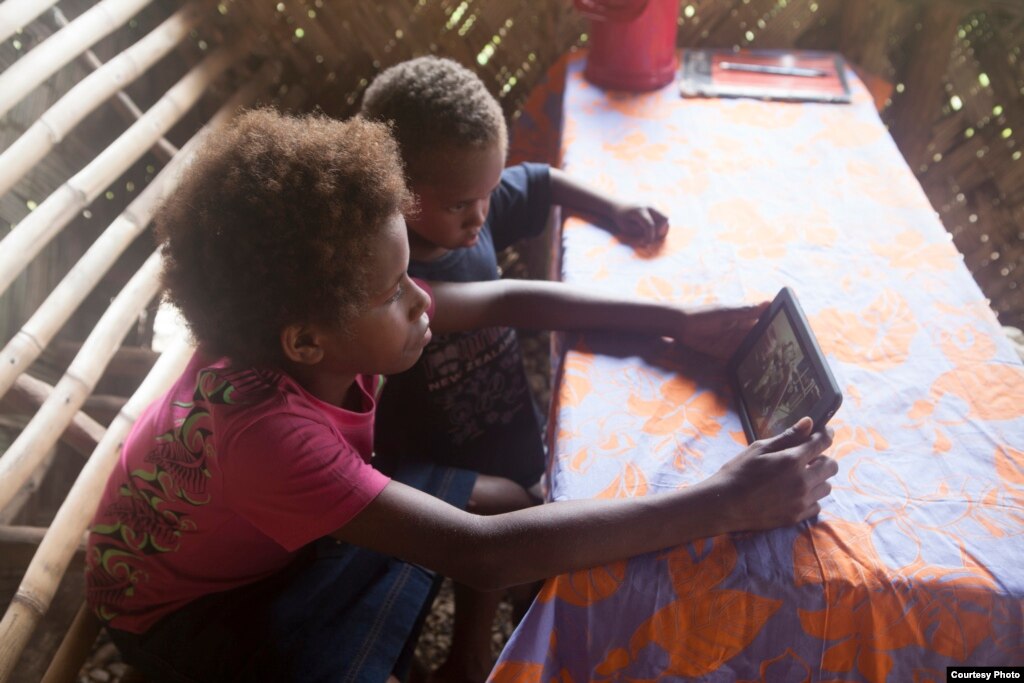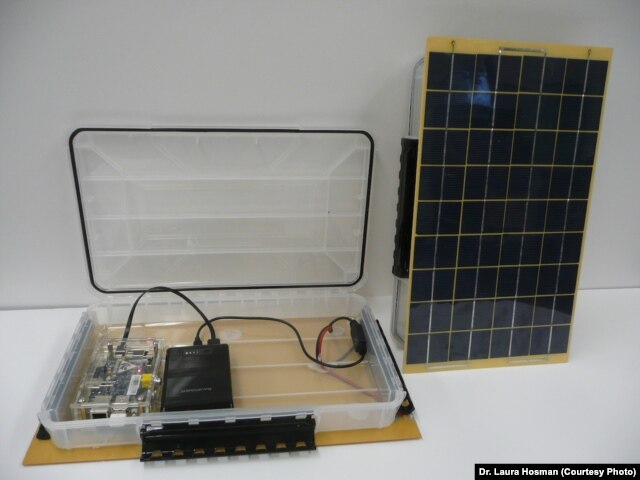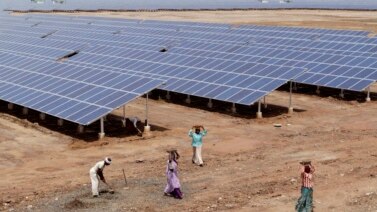
Alexis Cullen works as a volunteer in Vanuatu, one of the Peace Corp's most remote postings.
In the village where she works, called Naviso, some people have never heard of the Internet. That is not uncommon in the South Pacific, where some people have limited access to learning resources.
"Nobody has ever seen the Internet. People don't know what the Internet is. … Some of them are very separated out from what the rest of the world is doing."
And without the Internet, says Cullen, people in these areas are falling behind. It is not likely they will be able to access the Internet in the near future.
"As you sit and you wait, there are just the villages that get further and further behind. And how can you ever communicate, or be part of a global society, if people are waiting for you to get connected?”
The SolarSPELL unit
To help with that problem, Dr. Laura Hosman, a professor at California Polytechnic State University, and her students developed a mobile library. It is called SolarSPELL.
Dr. Hosman says she wanted to get educational content to rural places. She wanted to create a digital library that would not be ruined in bad weather.
The SolarSPELL unit, which is powered by the sun, creates a WiFi hotspot. Although it does not use the Internet, it creates a similar experience.

"So, any device that can connect to the Internet can connect to our library,” Hosman says. “And it seems like they are on the Internet, even though they are not. So it's an offline website that really feels like you are online."
It lets users practice using the Internet on a smaller scale.
A digital library
Each SolarSPELL unit comes with a memory card, a small plug-in device that holds the educational content in a computer.
It only uses a small amount of space, and does not rely on power cables or electricity networks.
Hosman and her students worked hard to find content to put in the library. They wanted to choose content appealing to people who live in rural areas in the South Pacific, such as Vanuatu and the Federated States of Micronesia.
"I wanted the students to be able to see themselves in the curriculum."
Partnership with the Peace Corps
The SolarSPELL team has partnered with the Peace Corps in Vanuatu and the Federated States of Micronesia. The Peace Corps has used about 50 SolarSPELL units.
The village where Alexis Cullen works, Naviso, has one unit. Alexis says that about 200 students have used it.
Using the SolarSPELL unit in other countries?
Hosman says SolarSPELL units could be used in other countries in the South Pacific.
Gabriel Krieshok is the Information and Communication Technologies for Development Program Officer at the Peace Corps. He says some technologies are appropriate to some areas, but not to others.
"I think one of the big challenges that we have is that there is this tendency to want tohave a one size-fits-all solution… And while it's really tempting to go down that road, it never works. I have yet to see a place where you can have one thing that works for everyone."
The challenge, he says, is balancing new technologies with what people need.
"How can I take what you guys have done here – like with, SolarSPELL is a really good example – and, you know, translate that to a post in East Africa or something like that?"
I’m John Russell.
Editor's note: Alexis Cullen's statements are her own opinions. They do not reflect the opinions of the Peace Corps.
John Russell wrote this story for Learning English. Kathleen Struck was the editor.
We want to hear from you. Write to us in the Comments section and on our Facebook page.
Words in This Story
posting – n. the act of sending someone to a place to work for a long period of time as part of a job
access – n. a way of being able to use or get something
mobile – adj. able to move from one place to another
digital – adj. using or characterized by computer technology
appropriate – adj. right or suited for some purpose or situation


